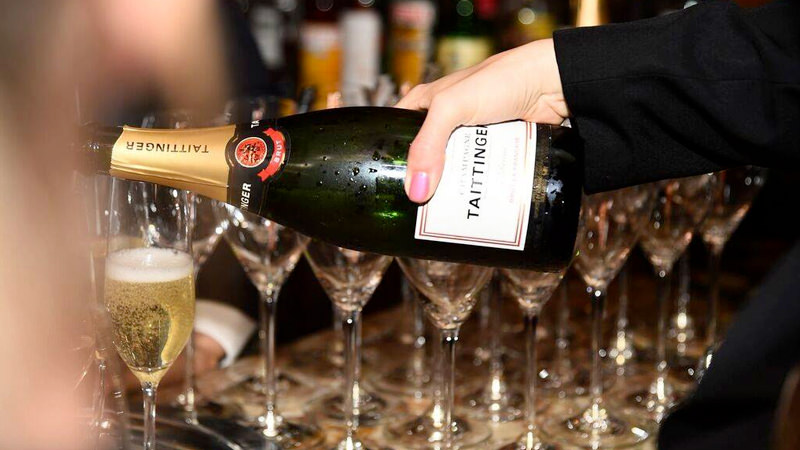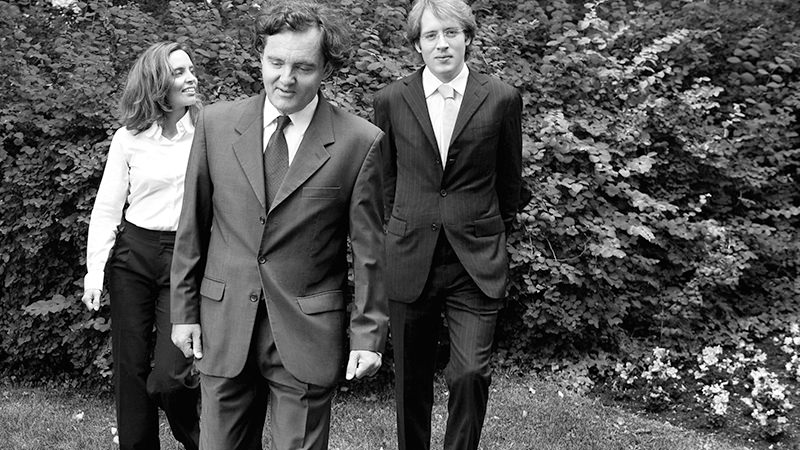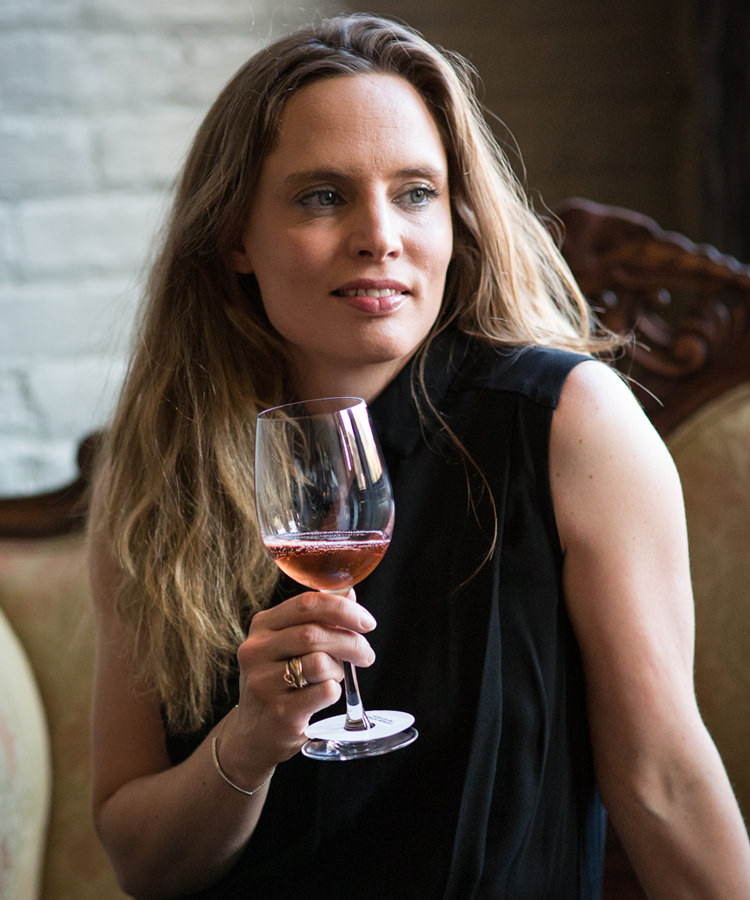For a nearly 300-year-old enterprise, the Taittinger Champagne house behaves remarkably like a startup. It’s thanks in part to Vitalie Taittinger, the art school-trained daughter of the business’s president, Pierre-Emmanuel Taittinger. For the past 11 years, Vitalie has helped steer the company toward new and exciting possibilities.
It’s something that might have seemed impossible just over a decade ago when Champagne Taittinger slipped from family hands and into those of an American private investment firm, a devastating move that to many aficionados seemed at odds with producing high-quality Champagne. One year and considerable maneuvering later, the elder Taittinger succeeded in wresting back control of the company. Ever since, the family has labored to restore Champagne Taittinger to its former glory — and then some. That’s where Vitalie comes in.
Working closely with her father and brother, Vitalie spends her days imagining Taittinger Champagne’s future. VinePair squeezed into her busy schedule to find out.
You’ve been running around a lot today! What’s a day in the life of Vitalie Taittinger like?
It really depends on the day! Sometimes I have three to four meetings and sometimes I have seven to eight. I try to find balance, but at the same time, it’s always really, really busy! I don’t know why.
What are you working on right now?
Well, this afternoon we had a big lunch pairing with our cellar master and culinary students from a big art school in Reims, the School of Art and Design of Reims. We tasted three rosés to make them understand all the dimensions of the wine with the food, but also to make them feel the sensation and emotion of it. The aim, after all, is for them to create a culinary universe of rosé: They will do three projects, all dishes inspired by rosé. The third and final one and will be published in our digital platform. It’s another way to communicate with consumers about our rosé. We might feature beautiful pictures, maybe movies. It will depend on what they’ll do.
I also had a meeting about recruitment, another about art, and after that another one with a new designer. It’s a lot of things to handle!

We can tell. You have a background in fine art. How does that factor into your job?
When you study art, you study the freedom of expression. You really go into value and authenticity. Every day it’s something that’s useful to me. Marketing and communication is really about that, too. I don’t want to become stronger by imitating other people — I want to find how to improve always, but in our way. Everything I do, I’m just thinking, “Is it our place or is it not? Are we free enough? Are we different enough?” I think this is something that comes from those studies. But I think that 11 years ago, I would never have imagined what I would be doing today.
Why’s that?
At the beginning, I would have loved to be an artist. I found a school that was specialized in art — how to draw, how to paint, how to sculpt. It was really precise and very demanding. But things changed when my father bought back the company. I was totally impressed by this very strong move.
What was it like when the company was sold? Was that a tough time for your family?
When the family decided to sell, for my father it was like disaster. It was shame. It was very hard for him to deal with, not because of ego, but it because he felt it was not fair to kill the work they had built together for many years. I think this period was hard, because we saw him very sad. He was very alone.
That must have been so difficult. How’d your family cope?
It was a period when we — my brother and I — were very close to him. We were there to push him and say, “We believe in you.” Those times were very important. You really feel the precious thing that it is to have back this company.
Not long after your family regained the company, you left the art world and joined the company. Was your dad excited about that?
When I first asked him, he was… not totally at ease with it. I don’t have a classical background for Champagne, and he also might not have wanted to take the risk with someone from his family — who’s maybe not good enough. He hesitated, but I insisted.
How’d you convince him?
He took me on as a consultant for a two-year trial period. At once, I started to work very hard for the company. At the beginning, I was more on my computer, sending things to the printers. I was really close to the realization of the projects, without directing anything. But then, he accepted me. For several years, I was in charge of the marketing department, and then afterward I was the artistic director. Now for two years, I am both marketing and communications director.
You might worry that people see me with a bad eye because I’m the daughter, but it’s not the case for us at Taittinger. Everybody is very happy that the family is working on the company, that me and my brother are here.
That’s so wonderful. Is it ever hard to work with family?
It’s really nice! But I could never have done this without having a good working relationship with my father and my brother. This job is very demanding and we have big objectives, and if you’re not 100 percent confident in the work each person is doing, it’s hard to keep the good relations. When we work together, we’re not seeing the family side of the thing. We’re really thinking as partners on a team. It’s very different when you’re working together than when you’re having a weekend together!

What do you love about Taittinger Champagne?
Oh! It’s a little light. It’s something that’s elegant, like a beautiful woman — very attractive and lively. It has made me dream for years!
We bet. What was it like growing up around it?
Well… I tasted it a little bit when I was young. Secretly! For us it was like a mystery, what was in this glass. After the aperitif at family events, when the room was being cleaned, secretly we went several times to taste the Champagne left over in glasses. It was very warm and not the same, though.
Do you remember your first real glass of Champagne?
We were traveling with my father — he’d organized a little trip, just three days. We were about eight people. The first day my father organized a little picnic with very good smoked chicken and, of course, a glass of Champagne. It was perfect. I was 13 years old, and it was the first time I really had the right to drink a glass of Champagne. It was very fantastic.
Do you think a small part of you knew then, in that moment, that you’d work in the family business one day?
The sensation I had drinking this glass of Champagne was perfect. But after, I didn’t know in myself that I would like to do something with Champagne. There was no projection at that time. Because when you think of a Champagne company, you have the impression you’ll only work on Champagne, but it’s really a discussion between Champagne and many other things — food, art, music, and so on. I never could have imagined that, or the richness of that.
Sounds like even though you didn’t plan to end up here, you’re glad you did.
I can tell that my father is proud. I think that he’s happy and confident. I think that for my father, it’s great to have your children behind you. I think it’d be the same with my own children. And for my brother and me, it’s really nice to be there for him.
